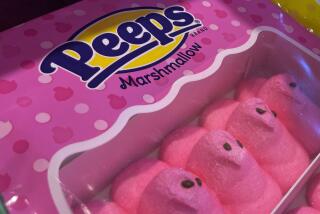Careful of these cures
Many Americans are at risk from the combinations of prescription pills, over-the-counter drugs, dietary supplements and foods they consume. According to a recent academic study, more than half of adults aged 57 to 85 use five or more prescription or nonprescription drugs, and about 4% take them in combinations that could cause dangerous interactions.
Surely these health threats lurking on supermarket and drugstore shelves are addressed by federal food and drug regulation? Not at all.
But before legislators reverse current policy and enact tighter controls, we should consider the best option for all stakeholders: voluntary oversight of dietary supplements by an independent but nongovernmental regulator. One apposite model is the Underwriters Laboratories, a large, nonprofit organization that tests and certifies thousands of products.
Voluntary certification by an independent entity -- sort of like a Good Housekeeping seal of approval -- would protect the long-term interests of manufacturers that chose to participate by bolstering their claims that they make a premium product. But more important, certification would offer consumers assurance of at least a minimal level of safety.
And safety concerns have mounted as the public has embraced dietary supplements to self-medicate with more “natural” remedies.
The formulations for herbal supplements -- or botanicals, as they are correctly called -- such as St. John’s wort and echinacea are often complex, highly variable and impure. Not very different from the 19th century snake-oil preparations that were dangerous but minimally (if at all) effective, many are toxic, carcinogenic or otherwise dangerous. Known side effects include blood-clotting abnormalities, high blood pressure, life-threatening allergic reactions, abnormal heart rhythms, exacerbation of auto-immune diseases and interference with life-saving prescription drugs.
Potentially harmful interactions with “real” drugs become exponentially more difficult to predict as the number of medications (and “pseudo-medications”) increases. The American Society of Anesthesiologists has warned patients to stop taking herbal supplements at least two weeks before surgery to avoid dangerous interactions with anesthesia.
So why aren’t these products regulated? Congress virtually exempted them from oversight under a 1994 law that prevents federal regulators from requiring assurance that botanicals are safe or effective, or even that dosage information on the label is correct. And in 1999, the Food and Drug Administration freed manufacturers to make all manner of dubious health claims -- that their products treat conditions such as premenstrual syndrome and acne, for example, although only a few have been shown to be efficacious for anything.
Moreover, with some large retailers selling higher-potency formulations, and more consumers taking large doses for long periods, safety problems are likely to increase, and a public health calamity seems inevitable. It could take the form of a large number of cases of organ failure or death in healthy people from ingesting a product that contains far more active ingredient than is indicated on the label. But even absent a high-profile, lethal incident, we are certain to have more people suffering from overdosing or under-dosing of critical drugs.
The beginnings of our highly risk-averse federal system of drug regulation date to 1938, when Congress responded to the contamination of an antibiotic by a toxic chemical called diethylene glycol, which killed more than 100 people. If a similar problem were to occur with botanicals, Congress would likely change their regulatory classification from “food supplements” to “drugs” in response to the ensuing outcry. The development, testing and FDA marketing approval of the typical new drug take 12 to 15 years and cost upward of $1 billion. Reclassifying botanicals as drugs would effectively spell the demise of the multibillion-dollar industry and the end of consumers’ access to a wide array of nontraditional medicines.
The voluntary oversight option would retain the widest latitude to select botanicals, as well as the freedom to choose certified or uncertified brands. (The problem of botanicals’ interference with “real” medicines would remain, however.)
Adoption of this regulatory model would move us closer to a truly free market, with consumers exercising independent and informed choice among a wide spectrum of competing products. Without it, we have no basis on which to make rational decisions, and we take unnecessary risks.






